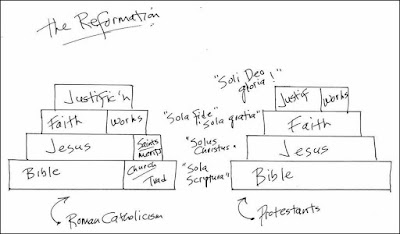The Reformation in seven minutes
Sometimes, when people would ask me about the Reformation, and why it's a big deal, I'd draw a little sketch on a piece of paper or napkin, like to one above. It's my seven-minute overview of what happened following Luther's posting of his 95 theses (points to debate) on the Castle Church door in Wittenberg on the eve of All Saints Day, 1517.
This is a very rough generalization indeed...
First key issue: authority. The foundation. How do we know we are right about what we believe about being right with God? The Roman Catholic church held that it was the Scriptures, but with a caveat: specifically, the Scriptures as interpreted and applied by the authority of the Church. So, to the authority base of the Bible was added the magisterium, that is, what the church, tradition, councils, and Popes officially ruled. It was the "Bible-plus..."
The Reformers said, no (or nay), the councils and traditions and church rulers are very important, but not infallible. The authority derives from God's revelation alone, namely the Bible. So, they used a slogan to summarize this point: "sola Scriptura", which is Latin for "the Scripture alone."
Second key issue: the merit of salvation. Upon that authoritative revelation is placed the work of Jesus Christ. Again, it becomes a matter of something-plus... The Roman church held that it was Jesus who was meritorious in his passion and resurrection, but that there is also merit (or grace) which proceeds from others. For example, Mary, and various Saints, were better than they needed to be and so their goodness became a surplus, or "treasury of merits" for believers to use in this world. Therefore, people could petition Mary or other Saints for aid or various needs because they had power and influence before God.
To this the Reformers also said, no, it is Christ alone who is meritorious and worthy. He is the sole fount of grace and salvation. Hence, "solus Christus," or Christ alone. They believed that the Bible taught that Jesus accomplished everything we need for life and eternal salvation, and that this is mediated to the believer through the Holy Spirit and the Word.
Thirdly, our response: faith. Upon the Christ revealed to us in the Scripture we place our faith. The Roman church said that this, too, was a matter of something-plus..., namely, faith plus works. Justification was viewed as a good beginning which could (and should) be improved upon. Ultimate justification (being declared righteous) would come when faith and works have been perfected by the end of this life, or perhaps in the next (hence purgatory). Assurance of salvation in this life was not really viewed as a good thing.
The Reformers again disagreed. As important as works were as evidence and fruit of living faith (and these are vitally important), yet faith itself is the empty hand which receives the completed gift of grace. From that faith one is justified (declared righteous), and from that faith comes good works. Assurance of salvation was viewed as a good thing which led to good works, by responding to grace in childlike gratitude. God's assessment of believers is wholly gracious (and unchanging) since it comes from his consideration of us in eternal union with his Son, rather than from the perfection (or imperfection) of our works. So again, the Reformers came up with a phrase, actually two: "sola gratia" (grace alone) and "sola fide" (faith alone).
In conclusion, the Reformers would assert, "soli Deo gloria", that is, God alone is glorified as the gracious Giver of our salvation from beginning to end.




Comments
Post a Comment